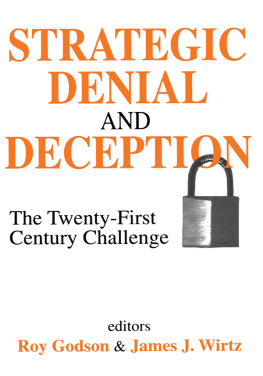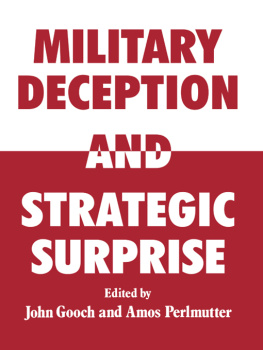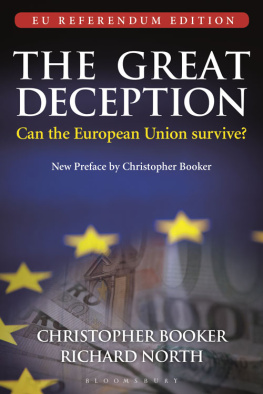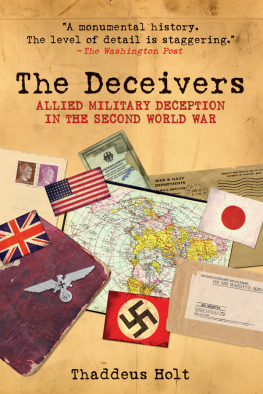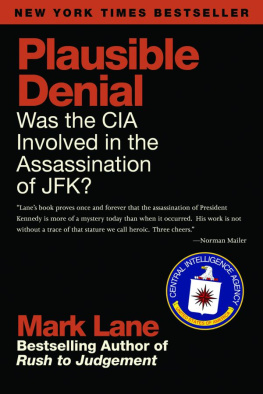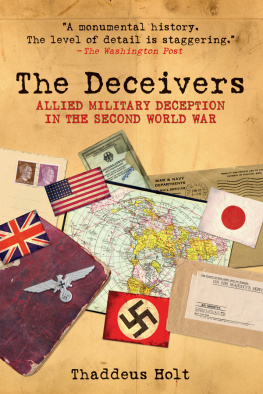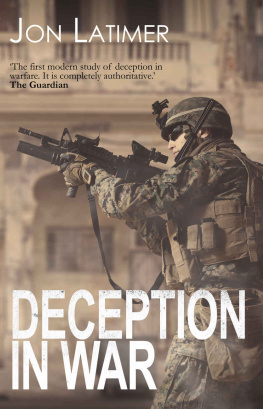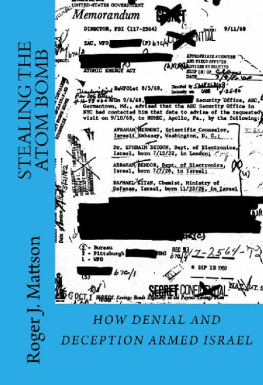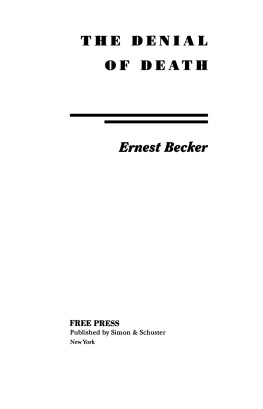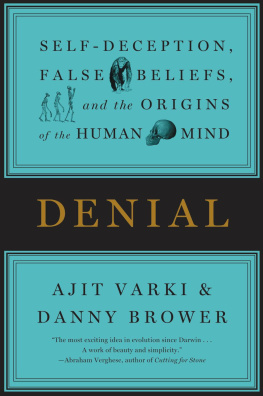First published 2002 by Transaction Publishers
Published 2017 by Routledge
2 Park Square, Milton Park, Abingdon, Oxon OX14 4RN
711 Third Avenue, New York, NY 10017, USA
Routledge is an imprint of the Taylor & Francis Group, an informa business
Copyright 2002 by National Strategy-Information Center, Washington, D.C.
All rights reserved. No part of this book may be reprinted or reproduced or utilised in any form or by any electronic, mechanical, or other means, now known or hereafter invented, including photocopying and recording, or in any information storage or retrieval system, without permission in writing from the publishers.
Notice:
Product or corporate names may be trademarks or registered trademarks, and are used only for identification and explanation without intent to infringe.
Library of Congress Catalog Number: 2001044348
Library of Congress Cataloging-in-Publication Data
Strategic denial and deception : the twenty-first century challenge / Roy Godson and James W. [i.e. J.] Wirtz, editors.
p. cm.
Includes bibliographical references and index.
ISBN 978-0-7658-0898-1 (paper : alk. paper)
1. Deception (Military science) 2. Military intelligenceUnited States. 3. Strategy. 4. Military art and science. 5. United StatesPolitics and government1945-1989. 6. United StatesPolitics and government-1989- I. Godson, Roy, 1942- II. Wirtz, James J., 1958-
U167.5.D37 S77 2001 |
327.1'4dc21 | 2001044348 |
ISBN 13: 978-0-7658-0898-1 (pbk)
1
Strategic Denial and Deception
Roy Godson and James J. Wirtz
A concern about the threat of high-level denial and deception has waxed and waned among Americans since the end of World War II. Sometimes they fear that denial and deception has shaped threat assessments: witness the 1976 A Team/B Team experiment in a competitive intelligence analysis undertaken by the Gerald R. Ford White House.1 At other times, the threat of denial and deceptionhere the euphoria accompanying the end of the Cold War comes to mindseems to fade into insignificance. As the United States reigns as the only superpower and the world experiences a communication revolution, how much of a threat does denial and deception pose to American interests today? Do globalization, proliferating communication technologies, and the dissemination of vast amounts of information make effective foreign denial and deception more or less likely? Will more information and data sources make policymakers better informed or will the proliferation of information simply create confusion?2
Strategic Denial and Deception Defined
Denial and deception (D&D) is a term often used to describe a combination of information operations that a nation undertakes to achieve its objectives. Denial refers to the attempt to block information that could be used by an opponent to learn some truth. Deception, by contrast, refers to a nations effort to cause an adversary to believe something that is not true.
Although they are distinct activities, denial and deception are intertwined in practice and are used as a single concept here. To deceive an opponent about the true intentions or goals of the deceiver, accurate information (e.g., about a military development program, a policy, a course of action, etc.) must be concealed or denied to the target. Deception, the effort to cause an adversary to believe something that is not true, can be undertaken together with denial operations. This involves using leaks, planted information, or decoys to create the impression that the truth is other than it actually is, thereby creating an alternative reality for the target. When denial and deception works, the deceiver leads the target to believe a cover story rather than the truth. The target will then react in a way that serves the deceivers interests.
The term strategic, more difficult to define, is used here to denote a high level of importance. D & D is strategic if it directly affects the national fortune and interests. Strategic denial and deception is related to the big picture. It concerns the major policies of a government, rather than the details of policy implementation. Strategic deception is thus aimed at the highest levels of a government or of the military chain of command (e.g., chiefs of state, cabinet members, or senior military commanders). The subject of the deception effort must be something that a high-level official would deal with personally. Similarly, strategic denial would be the effort to withhold information of the sort that is handled primarily by senior officials.
Foreign denial and deception occurs when state or nonstate actors (e.g., terrorist groups, criminal organizations, or separatist movements) use denial and deception to achieve their objectives against U.S. targets, interests, or policies. D&D also can be used by foreign adversaries as a strategic instrument in the sense that it becomes a primary means for disadvantaging the United Statespolitically or militarily. For terrorist or criminal organizations, D&D is a strategic instrument, much in the same way as the navy or nuclear weapons are strategic instruments for the United States. Criminals and terrorists use D&D as a strategic instrument to shape the environment so that they can better achieve their objects.
Various channels of communication are used by D&D practitioners. Sometimes intelligence sources and methods channel corrupt information to policymakers. Often, however, less clandestine methods of communication are used: media (television, radio, Internet) outlets, diplomatic interactions, academic exchanges and international travel and tourism. D&D does not require dedicated communication channels to be effective. In fact, D&D is often facilitated when the transfer of information appears to be incidental to the ostensible purpose of an event or contact. Diplomats, academics, and business travelers offer convincing conduits for the information they discover by accident during the regular course of their professional activities.
Successful Denial and Deception
Based on historical experience and deductive logic, a successful denial and deception campaign3 requires several components. First, the campaign benefits from strategic coherence. The deceiver nation must have an overall plan in mind for the achievement of its objectives; it must determine in advance how the target should behave and how deception will contribute to that outcome. The deceiver also must predict how the target will react in the wake of both successful and unsuccessful deception. This is no small task. Those contemplating deception may engage in wishful thinking when predicting the consequences of their deception campaign.4 Additionally, the deceiver must integrate its actions with (a) efforts to deny an opponent accurate information and (b) deceptive cover stories. Again, this is no small task. D&D campaigns require coherent, if not coordinated, action from many departments, agencies, or ministries. Public statements, press articles, and Internet communications must be shaped to support the goals of the nation intent on deception. As this corrupt information is disseminated, steps must be taken to prevent accurate information from reaching the target.

